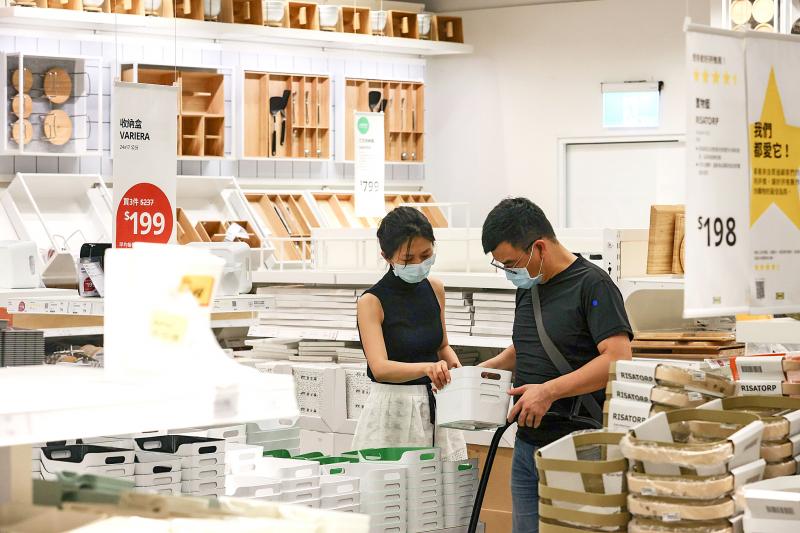Consumer confidence this month has slipped to an 11-month low as people expressed less interest in purchasing durable goods amid a lingering COVID-19 outbreak and movement restrictions, although optimism about stock investments increased, a survey released yesterday by National Central University found.
The consumer confidence index dropped 4.4 points to 70.48 from last month, with five of the six subindices weakening and one indicator gaining, the survey of 2,995 adults showed.
“The results were unsurprising as local infections have subsided, but not fast enough for authorities to lift the nationwide level 3 COVID-19 alert,” said Dachrahn Wu (吳大任), director of the university’s Research Center for Taiwan Economic Development, which conducted the survey.

Photo: CNA
Wu said that he expected consumer sentiment to improve or stabilize next month, helped by a rapidly rising vaccination rate following vaccine donations from Japan and the US.
People expressed less interest in the consumption of durable goods, with the subindex reporting the steepest retreat of 16.5 points to 94.25, its lowest reading since July 2010, the survey showed.
Wu said that it is natural for people to avoid or postpone buying vehicles, appliances and other big-ticket items when the outlook for employment and income is uncertain.
Interest in real estate remained relatively high, despite declining 2.5 points to 113.05, Wu said, adding that the retreat was probably related to movement restrictions due to the outbreak.
Confidence scores of less than 100 points indicate pessimism, while values of more than 100 suggest optimism.
The household income gauge fell 4.55 points to 87.2, while the job market gauge declined 4 points to 66.25, the survey showed.
Service providers, except for e-commerce companies and firms in supply chains, have been hit hard, as the government urges people to stay home to help rein in the outbreak.
People felt less confident about economic growth, with the subindex dropping 2.45 points to 86.8.
The consumer price gauge declined 1.5 points to 39.85, as people considered prices to be too high, rather than searching for good deals, the survey showed.
The stock investment gauge on stock investment bucked the downtrend with a rise of 2.5 points to 48.5, as the TAIEX rallied above 17,000 points this month thanks to investors becoming more interested in buying local shares, Wu said.
Strong corporate earnings and clear order visibility lent support to the local bourse, he added.
The virus outbreak would begin to come under control when the vaccine coverage reaches 20 to 30 percent, allowing consumer confidence to rebound, Wu said.

SPEED OF LIGHT: US lawmakers urged the commerce department to examine the national security threats from China’s development of silicon photonics technology US President Joe Biden’s administration on Monday said it is finalizing rules that would limit US investments in artificial intelligence (AI) and other technology sectors in China that could threaten US national security. The rules, which were proposed in June by the US Department of the Treasury, were directed by an executive order signed by Biden in August last year covering three key sectors: semiconductors and microelectronics, quantum information technologies and certain AI systems. The rules are to take effect on Jan. 2 next year and would be overseen by the Treasury’s newly created Office of Global Transactions. The Treasury said the “narrow

SPECULATION: The central bank cut the loan-to-value ratio for mortgages on second homes by 10 percent and denied grace periods to prevent a real-estate bubble The central bank’s board members in September agreed to tighten lending terms to induce a soft landing in the housing market, although some raised doubts that they would achieve the intended effect, the meeting’s minutes released yesterday showed. The central bank on Sept. 18 introduced harsher loan restrictions for mortgages across Taiwan in the hope of curbing housing speculation and hoarding that could create a bubble and threaten the financial system’s stability. Toward the aim, it cut the loan-to-value ratio by 10 percent for second and subsequent home mortgages and denied grace periods for first mortgages if applicants already owned other residential

EXPORT CONTROLS: US lawmakers have grown more concerned that the US Department of Commerce might not be aggressively enforcing its chip restrictions The US on Friday said it imposed a US$500,000 penalty on New York-based GlobalFoundries Inc, the world’s third-largest contract chipmaker, for shipping chips without authorization to an affiliate of blacklisted Chinese chipmaker Semiconductor Manufacturing International Corp (SMIC, 中芯). The US Department of Commerce in a statement said GlobalFoundries sent 74 shipments worth US$17.1 million to SJ Semiconductor Corp (盛合晶微半導體), an affiliate of SMIC, without seeking a license. Both SMIC and SJ Semiconductor were added to the department’s trade restriction Entity List in 2020 over SMIC’s alleged ties to the Chinese military-industrial complex. SMIC has denied wrongdoing. Exports to firms on the list

TECHNOLOGY EXIT: The selling of Apple stock might be related to the death of Berkshire vice chairman Charlie Munger last year, an analyst said Billionaire Warren Buffett is now sitting on more than US$325 billion in cash after continuing to unload billions of US dollars worth of Apple Inc and Bank of America Corp shares this year and continuing to collect a steady stream of profits from all of Berkshire Hathaway Inc’s assorted businesses without finding any major acquisitions. Berkshire on Saturday said it sold off about 100 million more Apple shares in the third quarter after halving its massive investment in the iPhone maker the previous quarter. The remaining stake of about 300 million shares was valued at US$69.9 billion at the end of